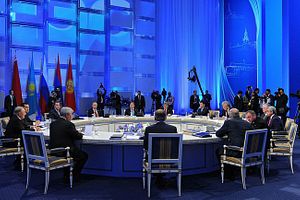After months of awkward delays and thinly disguised aversion, Kyrgyzstan has officially signed on to the Russia-led Eurasian Economic Union (EEU). Joining Russia, Kazakhstan, Armenia, and Belarus, Kyrgyzstan’s agreement will enter into full force by May 9. This agreement should put to bed rumors that Kyrgyzstan had pulled out of the arrangement, but nonetheless came with the distinct lack of enthusiasm recently seen in Bishkek’s rhetoric.
With this expansion has come a raft of questions that continue to poke holes in the Kremlin’s notion of the EEU as a group centered on equality, rather than a vehicle for Russia’s neo-imperial ambitions. Not only has Kyrgyzstan announced that it would not achieve all of the union’s regulations until 2020, but it remains wholly possible that the new customs requirements that would otherwise cut off Kyrgyzstan’s lucrative re-export trade from China may not be as rigorously enforced as otherwise demanded. Much like the new customs realities surrounding the Armenian-held enclave of Nagorno-Karabakh – which has recently seen at least one official come out vociferously against the EEU – these customs requirements may yet exist primarily on paper, without being translated to the reality on the ground. While the lack of enforcement may help tamp Kyrgyzstan’s looming unemployment crisis, it won’t exactly inspire confidence in the EEU’s efficacy.
This remains to be seen. What has arisen over the past week, however, is a sudden surge in divergences between the three founding members of the EEU. Relations between Kazakhstan and Russia had already seen a noted downturn in 2014 – and this past week only highlighted trends. Kazakhstani President Nursultan Nazarbayev paid a visit to Kyiv, offering financial and energy-based aid to the struggling Ukrainian government. The visit presents a stark volte face for Astana; Kazakhstan, after all, not only recognized the Crimean annexation earlier this year, but was the only nation besides Russia to refer to the EuroMaidan protests as a “coup.” Such recognitions make Nazarbayev’s recent claims that Kazakhstan supports Ukrainian territorial integrity a bit confusing. (Certain Ukrainian protesters have not forgotten Kazakhstan’s unwillingness to support the protests earlier this year, and publically voiced their opposition last week.) Now, Nazarbayev stakes that “both Ukraine and Russia are equally close to Kazakhstan.” Suffice it to say, Nazarbayev appears to be resuscitating Kazakhstan’s much-weakened multi-vector policy – likely because he recognizes the significant parallels between the Kremlin’s rhetoric surrounding both Kyiv and Astana.
While in Ukraine, Nazarbayev also offered some commentary on the EEU. The union, Nazarbayev said, “is exposed to a major risk.” Rather than citing the Russia-led currency slump or the collapsing intra-EEU trade, however, the Kazakhstani president noted the swell in Russian businesses hampering local commerce. This disadvantage has been accelerated that much more by Kazakhstan nationals crossing the border to take advantage of Russia’s weakened currency.
This rhetoric echoes much of what’s come from Belarusian President Aleksandr Lukashenko recently. In response to recent blockage of certain Belarusian firms – Moscow claimed such firms were helping circumvent Russia’s self-sanction from Western goods – Minsk reinstated customs control along the border. These controls defeat the primary purpose of the existing customs union, and only highlight the fickle nature of concepts of “rules” and “regulations” within the grouping. Lukashenko, for good measure, added that Russia had broken “all of our agreements that we have achieved in the customs union.” Likewise, he rebutted Russian officials who continually harp on about a potential EEU common currency, demanding that trade no longer be conducted in rubles.
These stark differences will likely not be sufficient to kill off the Eurasian Union. But they’re certainly indicative of just how farcical the alignment has become. In May, Russian President Vladimir Putin trumpeted the Eurasian Union as helping to herald a new “epoch.” In mid December, during his much-hyped, three-hour press conference, the Eurasian Union received all of five sentences. The EEU may not quite be dead on arrival during its official unveiling in January, but there’s little to indicate it will be worth more than the paper it’s written on for the foreseeable future.
































